BATS Curriculum
This page explains the BATS formal curriculum. In addition to formal curriculum classes, BATS offers specialty classes at all levels, Learn @ Work applied improv classes for individuals, and world-famous summer classes.

For people with limited time/resources or who aren’t sure improv is for them, we have developed two dip-your-toe-in-the-water introductory workshops. In our 2-hour online, or 3-hour classes, students use games and exercises to explore the basic concepts and skills of improvised theatre. And after you’ve had a taste, you may very well want the complete improv experience in Foundation 1, our 8-week beginner class, which more fully covers the material.
Intro to Improv
If you've ever been intrigued by improv and want to see what it's all about, this one-time, fun introduction to improv is just for you! In this 3-hour workshop you’ll learn the basics of improvised theatre -- spontaneity, playfulness, creativity, listening, storytelling, and more -- through fun games and exercises. Our coaches create a safe, inviting environment for trying new things and taking a few risks. You’ll stretch your boundaries (just a bit, no pressure) while you meet some new people, explore improv’s life lessons, and generally have a great time.
Improv for Shy People
Signing up for an improv class may be the last thing on your mind if you consider yourself shy, but at BATS, learning improv is extremely safe and supportive. Introverted folks can especially benefit from improv skills such as spontaneity, flexibility, and social/emotional risk taking. Taught by coaches experienced in creating a comfortable, safe environment, this class introduces:
- Presence under pressure.
- Listening and building on ideas.
- Meeting your inner critic and practicing the thinking that will foster connection.
You will experiment with stretching your boundaries (just a little, don’t worry) while you meet some new people, explore improv’s life lessons and have a great time.

A fun, playful, and engaging introduction to the principles and mindsets of improvisation and the BATS style of improv.
The class will focus on developing the ensemble and honing these foundational skills:
- Listening
- Support
- Spontaneity
- Imagination
- Collaboration
Students will learn the groundwork for the creative magic of improvising stories together. World-class coaches guide students through the first exciting stages of improvisation in a safe, friendly atmosphere.
At the end of F1, the coach will make a recommendation for each student about what next step is best — repeating F1 to strengthen the necessary skills or moving to Foundation 2: Movement & Story.
Still on the fence?
Here’s why you should study improv at BATS.
NOTE: Attendance at the first session of your course is strongly encouraged. If you think you will have to miss the first session of your Foundation 1 class, please notify the office before registering.
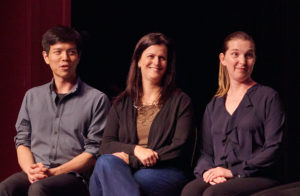
Foundation 2 moves further down the path to fully improvised scenes and stories by putting the mindsets from Foundation 1 into a scene structure while staying present physically in the moment and with your partner.
In F2 you will learn how to:
- Put the building blocks of improvised worlds together and learn the skills that will enable you to create in a relaxed state of play.
- Improvise from a grounded physical state that will be your touchstone when you don’t know what to say.
- See and respond to what is already present, allowing you access to the creative part of your mind that intuitively knows what comes next.
- Inhabit character and story throughout the body while creating fully realized environments out of thin air.
- Identify the basic information of the scene. Who are these characters, how do they know each other, where are they and why are they there?
Students that complete F2 are eligible to perform in the weekly Sunday Student Jams.
At the end of Foundation 2, the coach will make a recommendation for each student about what the next step is best — repeating F2 to strengthen the improviser’s physical awareness or moving to F3: Character & Relationship.
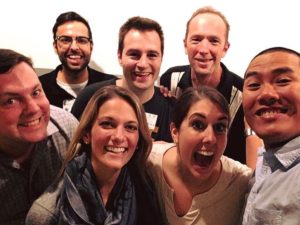
Foundation 3 is a deep dive into this vital ingredient of successful scenes: strong, colorful, committed characters.
In F3, improvisers learn:
- How to create characters and develop relationships between characters that fuel the developing story.
- How to create characters with subtle shifts in the body, face, and voice to tell their stories.
- How to develop fully realized characters with strong points of view and wants that drive the story forward.
The goal of this class is to expand your character range and hone your skills at creating and sustaining believable characters -- all in an extremely playful atmosphere.
At the end of F3, the coach will make a recommendation for each student about what the next step is best — repeating F3 or moving to F4: Scenework & Acting Skills.
Building on the improv foundational skills learned in F1-F3, now the improvisers will learn scene structure and acting skills that will help them create story on the spot.
In Foundation 4 improvisers will learn:
- Identifying the basic information of the scene. Who are these characters, how do they know each other, where are they and why are they there?
- How to effectively start scenes, build them in the middle, and successfully “land the plane.”
- How to embody the basic information of the scene. How can we as actors, shift our body, face, voice and imagination to establish and support the world we are creating.
- Basic acting skills that lend themselves to believeable storytelling.
At the end of F4, the coach will make a recommendation for each student about what the next step is best — repeating F4
, going to the Improv Gym to hone specific skills, or moving to F5: Longform Narrative.

Foundation 5 uses all skills in F1-4 to build longer, sustained stories in rich varied worlds which come alive as you create them with your improv partners.
In this focus on narrative, improvisers will learn:
- The basic structure of a traditional narrative.
- How to identify and create the beginning, middle, and end of a longer story so it feels satisfying and cohesive.
- Identifying the protagonist, raising the stakes, the circle of possibilities, leaning into consequences and supporting a fleshed out improvised reality in which to create a world with its own logic and consistency. Students will also explore the concepts through the specific lens of genre and start to tell stories in different styles.
- All of these skills contribute to improvising rich stories that can cover all tones, from comedy to tragedy and everything in between.
At the end of F5, the coach will make a recommendation for each student about what the next step is best — repeating F5, going to the Improv Gym to hone specific skills, or moving to F6: The Performance Showcase.

The name of the game in Foundation 6 is getting performance ready with a specific, well-researched genre. At the end of this 8-week course, the ensemble will present multiple performances to invited audiences of a genre and format that they research and rehearse together.
In F6 improvisers will learn:
- How to approach a genre with an eye to playing it truthfully and faithfully.
- The unique skills and nuances of a particular genre and how to recreate the tone of a genre with improvised stories.
- The ways that performing can change the energy of improvisers and improvisation in the safety of workshop performances.
At the end of Foundation 6, the coach will make a recommendation for each student about their next step — repeating Foundation 6, going to the Improv Gym to hone specific skills, or moving to the Ongoing Beginning Performance Lab to start the improvisers performance journey.
Come build up your improv muscles at BATS’ Improv Gym! The Improv Gym is more like a traditional gym than like a typical improv class. Rather than committing to 6 or 8 weeks, you can subscribe to the gym one month at a time and then drop in to play with a variety of coaches during that month. You’ll get to play with several coaches and other students while learning new skills and practicing old ones. Starting in January, you will have two options for the Improv Gym:
—Online Gym: This gym is entirely online on Wednesdays and Thursdays from 7-9 pm PST. The cost is $175 per month. When you subscribe, you can attend as many or as few of the workouts as you want for that month. On nights you choose to attend, we ask that you stay the whole time rather than popping in for a few minutes.
—Hybrid Gym: This gym includes the Wednesdays and Thursdays online PLUS a Saturday gym that happens in-person at Ft. Mason from 11am to 1pm PST. Members of the Hybrid gym can attend any Wednesday, Thursday, and/or Saturday. The cost for the Hybrid gym is $225.
For March, some of the coaches lined up include Derek Yee, Basel Al-Naffouri, Dave Dennison, Brian Jones, Jenny Rosen and Corey Rosen. Coaches may focus on specific skills, games, or genres, or they may ask the gym members what they’d like to work on, so feel free to show up with requests.
The gym is open to anyone who has completed F2 or above.
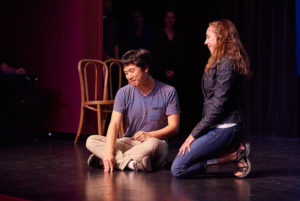
Students will work with a coach who provides ongoing training that includes performance techniques and genre-specific instruction. At the end of this training, students will rehearse and perform shows designed and directed by their coach. The traditional performance labs are currently offered online and in-person.
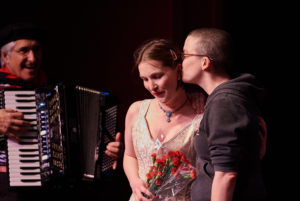
Students will work with a coach who provides ongoing training that includes performance techniques and genre-specific instruction. At the end of this training, students will rehearse and perform shows designed and directed by their coach. The traditional performance labs are currently offered online and in-person.
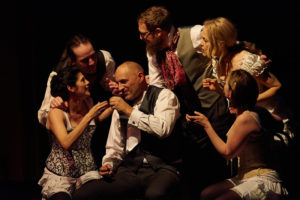
The private group labs give advanced improvisers more autonomy in their experience. For the private groups, improvisers will start by gathering their own group of players and choosing one of BATS’ fantastic coaches. The group will work with the coach to determine what sort of instruction they want— a specific genre or skill, ongoing workshop or weekend intensive. It’s up to you! You work with BATS to decide the times and dates. Your group may even decide to perform and will work with the coach to plan and rehearse for your show(s).
Please email our Head of School
stephanie@improv.org if you are interested in a Private Performance Lab.
Specialty classes give you more opportunities to play and have fun while deepening your improv knowledge. Classes range from one to four weeks and explore a variety of improv specialties: working with puppets, improvising song or freestyle rap, using your voice in a radio drama, honing in on the potential of a positive mindset and more! These classes are a great place for all improvisers to explore a distinct element of improv in more depth, working with coaches who are skilled in that particular area.
Learn @ Work is our Applied Improv offering for individuals. Classes range from one to four weeks and explore a variety of improv specialties: working with puppets, improvising song or freestyle rap, using your voice in a radio drama, honing in on the potential of a positive mindset and more! These classes are a great place for all improvisers to explore a distinct element of improv in more depth, working with coaches who are skilled in that particular area.
Note: Our Summer Sessions often sell out, so we strongly encourage you to register early
Improv classes for children aged 5-8.
Our youth classes provide individual attention from experienced coaches who have worked with youth and teen improvisers for many years. Students explore the concepts and skills of improv through games and exercises, and most classes culminate in a showcase performance for family and friends.
Our teen classes provide individual attention from experienced coaches who have worked with youth and teen improvisers for many years. Students explore the concepts and skills of improv through games and exercises, and most classes culminate in a showcase performance for family and friends.
Youth summer classes
 A fun, playful, and engaging introduction to the principles and mindsets of improvisation and the BATS style of improv.
The class will focus on developing the ensemble and honing these foundational skills:
A fun, playful, and engaging introduction to the principles and mindsets of improvisation and the BATS style of improv.
The class will focus on developing the ensemble and honing these foundational skills:






 The private group labs give advanced improvisers more autonomy in their experience. For the private groups, improvisers will start by gathering their own group of players and choosing one of BATS’ fantastic coaches. The group will work with the coach to determine what sort of instruction they want— a specific genre or skill, ongoing workshop or weekend intensive. It’s up to you! You work with BATS to decide the times and dates. Your group may even decide to perform and will work with the coach to plan and rehearse for your show(s).
Please email our Head of School stephanie@improv.org if you are interested in a Private Performance Lab.
The private group labs give advanced improvisers more autonomy in their experience. For the private groups, improvisers will start by gathering their own group of players and choosing one of BATS’ fantastic coaches. The group will work with the coach to determine what sort of instruction they want— a specific genre or skill, ongoing workshop or weekend intensive. It’s up to you! You work with BATS to decide the times and dates. Your group may even decide to perform and will work with the coach to plan and rehearse for your show(s).
Please email our Head of School stephanie@improv.org if you are interested in a Private Performance Lab.